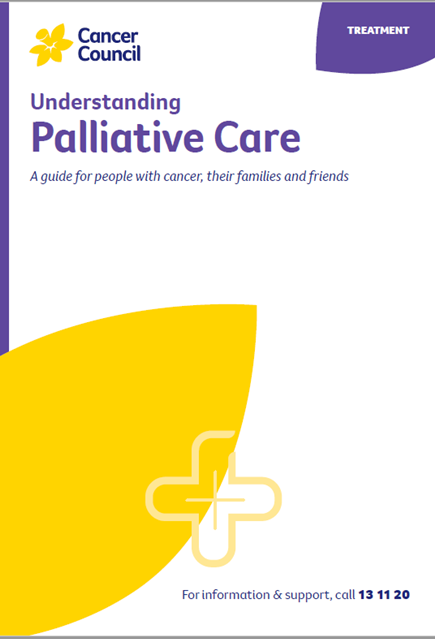- Home
- Cancer Information
- Advanced cancer
- Palliative care
- Common questions about palliative care
- Can I still have cancer treatment?
Can I still have cancer treatment?
If you have palliative care, you can still have active treatment to shrink the cancer or slow its growth. The palliative care team will work with your cancer specialists to manage side effects from treatment and maintain your quality of life. Cancer treatments such as surgery, drug therapies and radiation therapy may also be used as part of palliative treatment. In this case, the aim is not to cure the cancer, but to control the cancer or relieve symptoms. You may also want to consider joining a clinical trial.
→ READ MORE: Does palliative care shorten or lengthen life?
Podcast for people affected by advanced cancer
Listen now
More resources
Prof Meera Agar, Palliative Care Physician, Professor of Palliative Medicine, University of Technology Sydney, IMPACCT, Sydney, NSW; Anne Booms, Nurse Practitioner, Palliative Care, Icon Cancer Centre Midlands, WA; Nicola Champion, Consumer; John Clements, Consumer; Dr Alexandra Clinch, Palliative Medicine Specialist and Deputy Director, Palliative Care, Peter MacCallum Cancer Centre and Royal Melbourne Hospital, VIC; A/Prof Jaklin Eliott, School of Public Health, University of Adelaide, SA; Dr Jemma Gilchrist, Clinical Psychologist, Mind My Health, NSW; McCabe Centre for Law and Cancer, VIC; Caitlin MacDonagh, Clinical Nurse Consultant, Palliative Care, Royal North Shore Hospital, NSW; Dr Roya Merie, Radiation Oncologist, Icon Cancer Centre, Concord, NSW; Dr Deidre Morgan, Research Centre for Palliative Care, Death and Dying, Flinders University, SA; Caitriona Nienaber, 13 11 20 Consultant, Cancer Council WA; Palliative Care Australia.
View the Cancer Council NSW editorial policy.
View all publications or call 13 11 20 for free printed copies.



